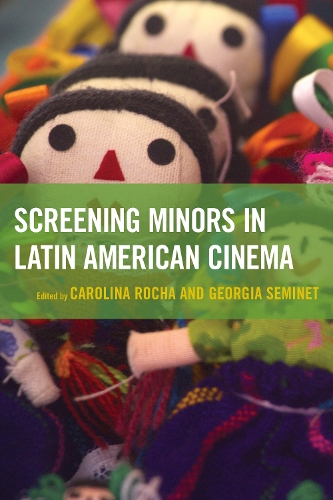
Screening Minors in Latin American Cinema
(Hardback)
Available Formats
Publishing Details
Screening Minors in Latin American Cinema
By (Author) Carolina Rocha
Edited by Georgia Seminet
Contributions by Jack A. Draper III
Contributions by Sophie Dufays
Contributions by Hlmfrur Gararsdttir
Contributions by Amanda Holmes
Contributions by Alejandra Josiowicz
Contributions by Juli A. Kroll
Contributions by Walescka Pino-Ojeda
Contributions by Rachel Randall
Bloomsbury Publishing PLC
Lexington Books
26th August 2014
United States
Classifications
Professional and Scholarly
Non Fiction
Literary studies: general
Gender studies, gender groups
Regional / International studies
791.43098
Physical Properties
Hardback
224
Width 163mm, Height 234mm, Spine 21mm
467g
Description
Screening Minors in Latin American Cinema is the first volume to delve into the construction of children's subjectivity and agency in Latin American film, and addresses such questions as: How and to what extent do films express the point of view of the child How do plots and film practices represent childrens subjectivity and agency Childhood studies has demonstrated the importance of examining the lives of children. Building on those insights, together with current research from film studies and Latin American cultural studies, the essays in this volume analyze the development of agency and voices of minors in contemporary Latin American film. The theoretical perspectives usedgender studies, psychoanalytic and postcolonial theory, film studies, play and performance studies, and emotion studies, among otherstake into account innovative approaches to filmic techniques as they explore the varied representations of children.
Reviews
The volume definitely advances the focus on childhood and adolescent subjectivities from a rich and current theoretical approach, including gender studies, psychoanalytical and post-colonial theory, film studies, play and performance studies, and emotion studies. In short, the volume is a first in the fast-evolving field of youth subjectivities in Latin American cinema, as well as a successful attempt to historicize Latin American subjectivity processes as expressed through the voice and point of view of the children and adolescents depicted in the cinema of the region. Screening Minors in Latin American Cinema is history in the making, literally. * Arizona Journal Of Hispanic Cultural Studies *
This is a worthwhile introductory text for scholars interested in this relatively new field of study. [O]ne of the strengths of the collection is that it brings together a number of perspectives from psychoanalysis, postcolonial theory and biopolitics, to affect and disability studies [T]he collection is valuable as it presents several approaches entailing subjectivity and agency as related to childhood and representation in film, and thus offers the reader different ways of thinking through this growing and engaging area of enquiry. * Studies in Spanish & Latin American Cinemas *
From fascinating analyses of individual films to insightful overviews of broad swaths of films, and addressing a variety of genresincluding documentaries, road films, and adult dramasthe chapters in this volume explore films that imagine children as looking, looking back, taking action, speaking up, and coming to terms with themselves as children, often in the context of difficult circumstances. While the adult-dominated film industry often uses children as allegory to address adult concerns, a particular strength of this volume (and the films it examines) is its commitment to understanding children as having agency and full subjectivity, to understanding the complexity of childhood itself. -- Sarah Projansky, University of Utah, author of Spectacular Girls: Media Fascination and Celebrity Culture
Carolina Rochas and Georgia Seminets Screening Minors in Latin American Cinema focuses on the theme of the cinematographic representation of children and youth in Latin American cinema. Drawing from recent theories on childrens agency, this volume focuses on the representation of subjectivity as developed in diverse social contexts. The choice of films demonstrates how the contemporary global paradigm and the heterogeneous models of subjectivity of children and youth are portrayed in the twenty-first century. The contributors to the volume carry out sound analyses showcasing a variety of poststructuralist frameworks that range from gender and sexuality to border studies, all within the central question of film studies about how the childrens gaze is constructed visually, whether as an object or as the children reversing the gaze and becoming the locus of looking, thus engaging the viewer in an inter-subjective process. -- Rita De Grandis, University of British Columbia
Author Bio
Carolina Rocha is associate professor of Spanish at Southern Illinois University Edwardsville. Georgia Seminet is associate professor of Spanish at St. Edwards University.
